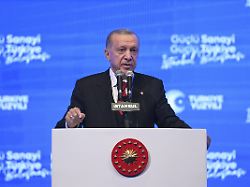“Only for a short time”
Erdogan: Gulf states supported Türkiye with capital
05/25/2023, 10:19 p.m
Turkey is in a deep economic crisis. So much so that in the meantime the Gulf States had to help out with capital, as President Erdogan now reveals in an interview. However, he leaves open who delivered how much money.
According to President Recep Tayyip Erdogan, Turkey has been temporarily supported with capital from the Gulf States. The countries have thus provided relief for the Turkish central bank and the financial markets, said Erdogan in an interview with the broadcaster CNN Turkey. “Our economy, banking and financial system is quite strong. For the time being, some Gulf countries have put money into our system – even if it’s only for a short time.”
After the runoff on May 28, he wanted to thank the donors. Erdogan did not name any countries or amounts. Turkey has already concluded swap agreements with the United Arab Emirates, China, Qatar and South Korea worth around 28 billion US dollars in recent years.
Erdogan is given a good chance against his competitor Kemal Kilicdaroglu in Sunday’s runoff election. Turkey is in the midst of an economic crisis. The national currency, the lira, has depreciated drastically – by almost 80 percent against the dollar within five years. This in turn exacerbates the inflation problem, since Turkey has to import many goods and raw materials, which are becoming more expensive due to the weak lira. The inflation rate rose to 85 percent last year and is currently almost 44 percent. This gnaws at the purchasing power of the Turks.
Central bank not touching key interest rate before run-off election
Most recently, the Turkish central bank had not raised its interest rates shortly before the runoff election for the presidency, despite high inflation. The monetary authorities announced that the key interest rate would remain at 8.5 percent. They lowered it from 14.0 to 9.0 percent last year. In February, after the devastating earthquake in the country, it fell again by half a percentage point to the current level in order to support the economy and employment.
The central bank announced that it would give priority to creating favorable financial conditions in order to minimize the economic consequences of the disaster and support economic recovery. “It is becoming apparent that the earthquake will not have any lasting effects on the performance of the Turkish economy in the medium term,” said the monetary authorities at the same time.
However, according to economists, the comparatively loose monetary policy has significant side effects, while the major central banks around the world have raised their interest rates significantly in the fight against inflation.
President Erdogan, who describes himself as an “interest enemy” and wants to use cheap money to boost the economy, is behind the central bank’s course. However, there are voices within the government calling for a change in economic policy. “They are studying a new economic model because the existing model cannot be sustained,” a senior government official, who wished to remain anonymous, told Reuters. “Basically, it would gradually increase the interest rate.”
